Scaling Facebook Ads For Ecommerce [Ultimate Guide]
Download Now.
Dental SEO is one of the most effective marketing strategies for growing dental practices in 2023.
Dental SEO combines local SEO to target specific suburb areas and broader SEO expertise to target more competitive search terms and specific services like ‘dental implants’, ‘crowns’ etc…
Can you do your dental SEO yourself?
There is no reason you can’t learn and apply the SEO strategies outlined in this guide yourself and it’s why I’ve put this step-by-step guide together for you.
However, most Dentists are busy running their practice and are short on time, so it can make a lot more sense to hire an SEO agency that knows exactly how to rank their Dental practice at the top of Google.
When a new patient is looking for a dentist, they’ll get on their phone or computer and perform a Google search for ‘dentist near me’, ‘best dentist’ or any other similar related search to find dental practices near them.
If your dental website appears at the top of Google when a new patient is looking there is a high chance they’ll click on your listing and book an appointment with you. It’s why SEO is such a powerful marketing strategy for dentists because people are actively looking for you and are ready to book an appointment right away.
Should You Hire A Dental SEO Expert?
This question comes down to how much spare time do you have to invest in learning and doing all the marketing yourself?
If you have the time then absolutely, you should try to improve your dental website’s SEO using the steps in this guide.
If you don’t have the time then it can make a lot of sense to outsource this area of your business to an SEO professional like Engine Scout to help you get to the top of Google quickly.
Before you begin your SEO campaign, it’s important to first understand how Google treats your website.
For example, below you can see Google displays results when you type in ‘dentist near me’.
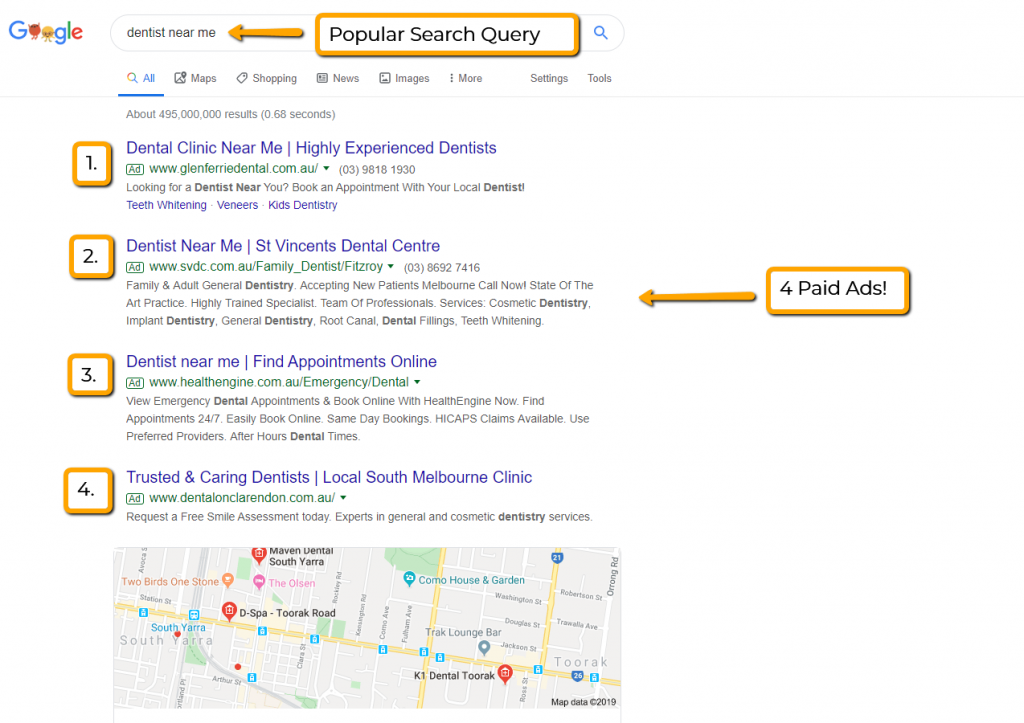
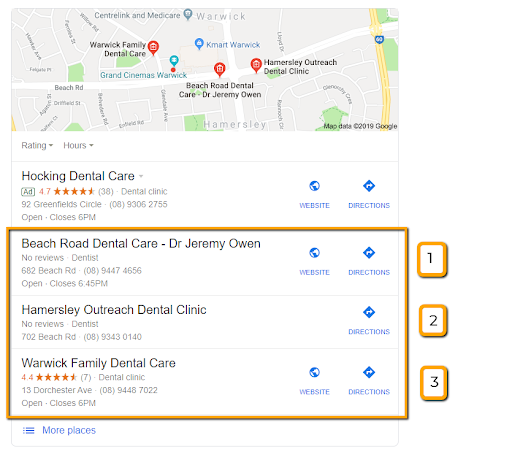
Local ‘Map Pack’ Listings
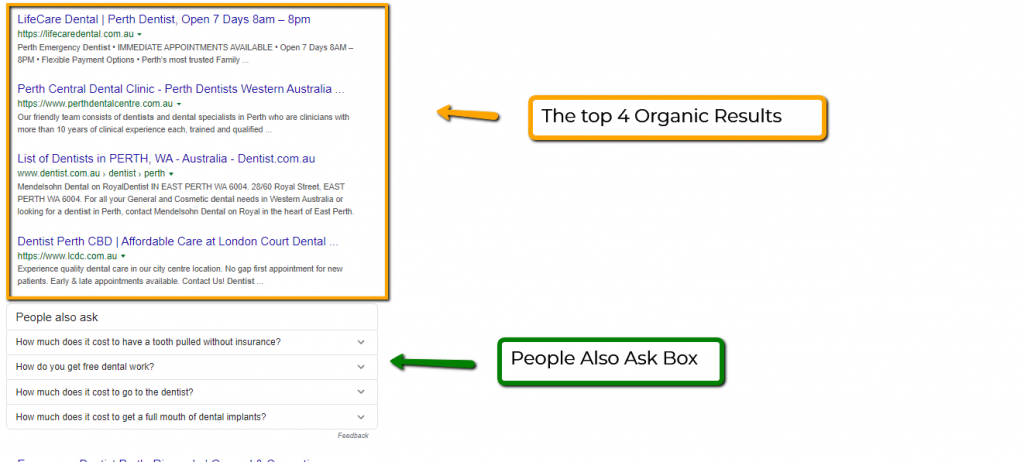
There’s a lot of things happening on Google when someone searches for a Dentist. By understanding what Google is rewarding, you can use this to your advantage and to get ahead of other dental websites competing for the same search engine real estate.
Let’s take the above example, if you look closer at the top 10 organic search results, you can see 3 of the top 10 results are ‘directory listings’.
Bingo!
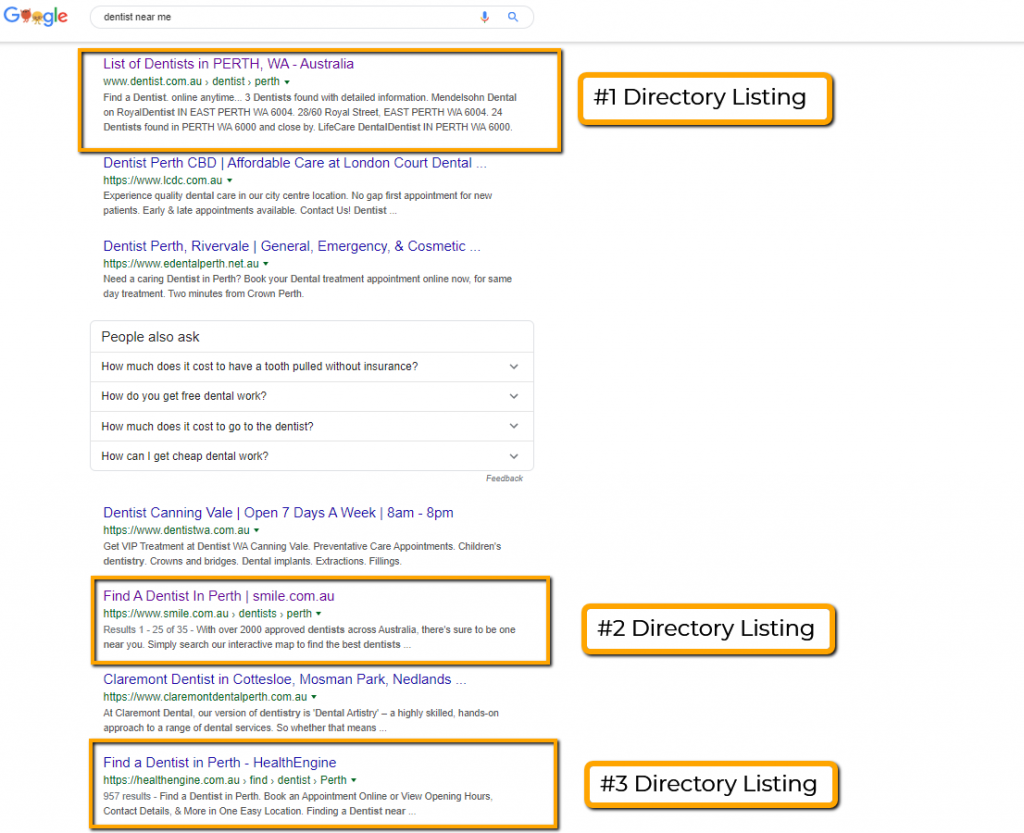
Dental Directories on Googles first page.
These directory sites present a great opportunity to quickly increase your dental website’s online visibility and traffic.
Think about it…
These directory websites have already put the hard work into ranking on the first page of Google, so why not leverage this to your advantage?
Most of these dental directory sites have their own internal search algorithm for deciding which dental practice gets the #1 position. Getting the #1 spot on these directory sites is easier than ranking on Google and is a good tactic to get some early online success.
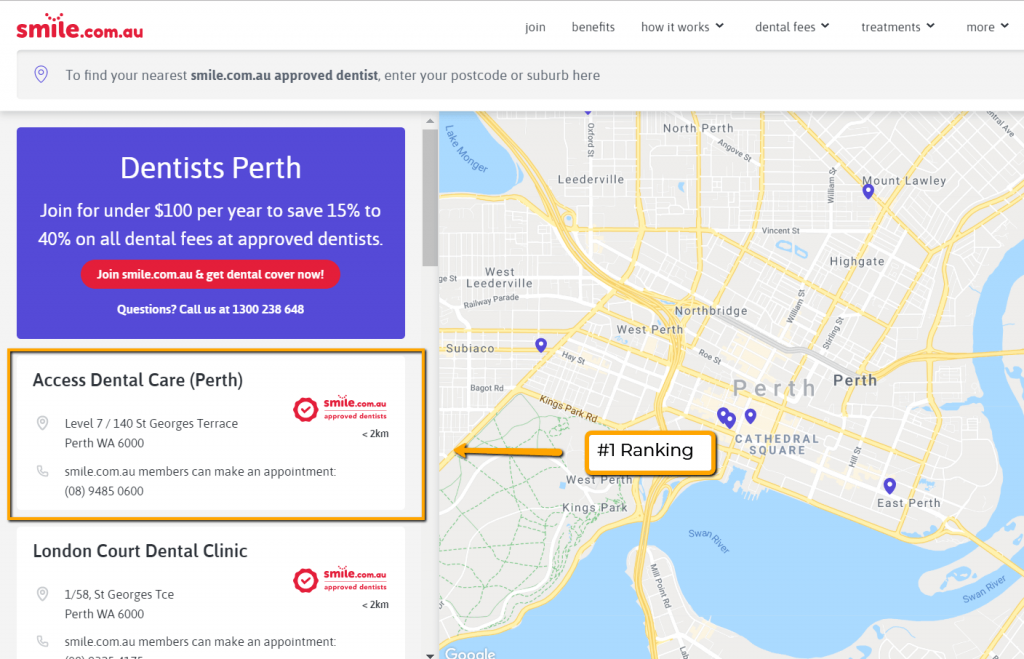
Ranking your dental website on directory websites is an effective way to get new dental patients.
Dental SEO is a competitive space because of how lucrative it is and they high amount of competition out there. You have to think outside the box with your SEO, especially in the early stages of your campaign.
Keyword research is the foundation of your dental SEO campaign.
You have to know which keyword to target and which keyword attracts new patients to your business.
How to find keywords that attract new patients:
A great place to begin keyword research is with Google’s own keyword research tool – Keyword Planner. Keyword planner can quickly find some great keywords to kick start your SEO campaign.
Once you open Keyword Planner, enter a search query you’d like to explore and the tool will give you a list of potential keywords you can include for SEO purposes.
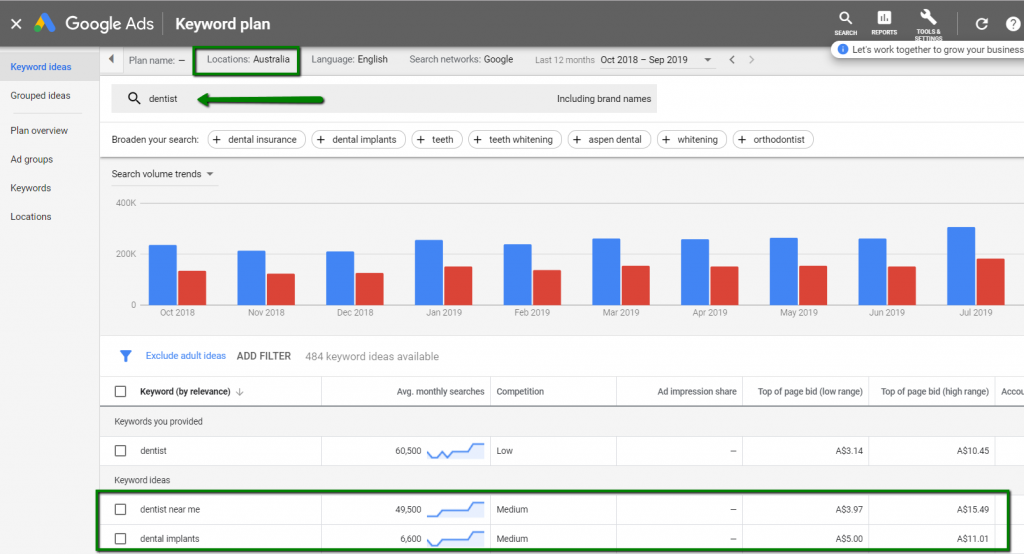
Keyword Research using Google’s Free Keyword Planner Tool.
You want to focus on keywords that target appointment bookings, not visitors to your website.
For example, let’s look at two potential keywords you could choose to target.
1. Commercial Keywords
These are search terms people type into Google when they’re looking to book a dental appointment.
These can include keywords such as ‘Best Dentist Melbourne’ or ‘Dentist near me’ as examples.
You’ll often see Google paid ads appearing for these types of keywords which can be a great clue that these keywords are ‘money keywords’.
Why else would your competitors be paying for clicks on them?
2. Informational Keywords
People type these search terms into Google when they’re in research mode and looking for information about your services.
For example: ‘How much do dental implants cost?’
While it would be beneficial to rank for these types of searches you’ll need to invest in content marketing to make it happen.
3. The key to successful keyword research
When choosing what keywords to target the best strategy is to capture the market and rank for both informational and commercial keywords if your budget allows.
The next best strategy is to prioritise commercial keywords as these can be a direct revenue-generating source.
Commercial or ‘money’ keywords bring new patient bookings for your dental business.
As a Dentist, you offer more than just a regular checkup.
Services including crown replacement, dental implants, braces and dental surgery are just a few of the additional service offerings.
For optimal results, your web design must consider technical SEO, conversion rate optimization and customer experience to succeed in 2023 and beyond.
Here’s how to structure and optimise your website for dental-related services:
Add a separate landing page for each service you offer.
Example URL structure: www.smiledental.com.au/our-services/dental-implants/
Creating separate service pages for each service your clinic provides allows you to rank for all of your offerings instead of a single keyword like ‘dentist near me’.
Add sub-service pages for even more significant traffic gains.
Example URL structure: www.smiledental.com.au/our-services/dental-implants/types/
Adding sub-service pages will allow you to pick up long-tail keywords.
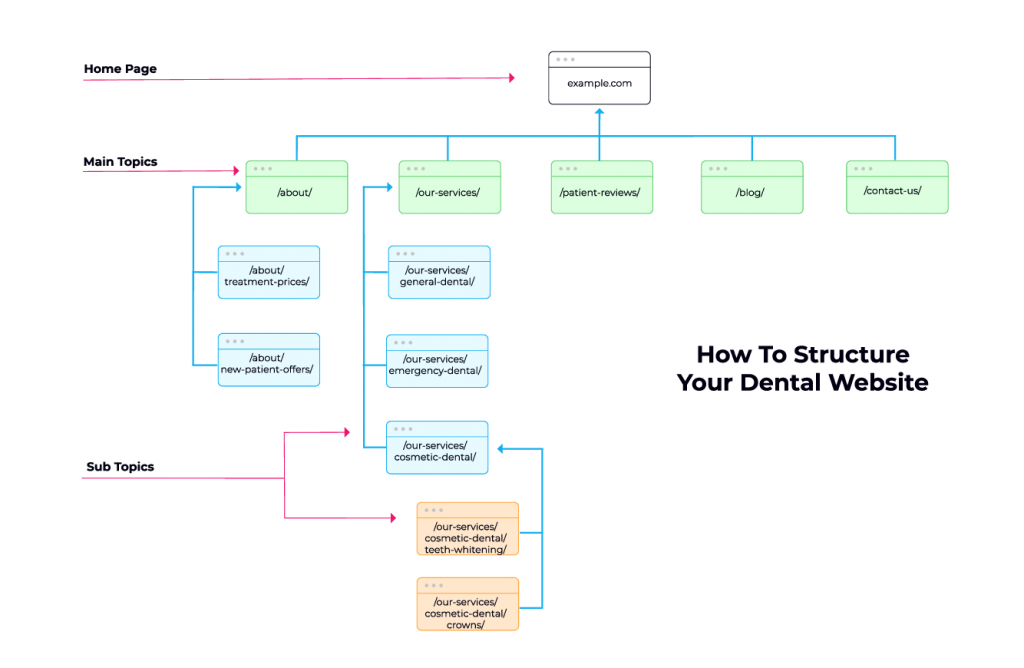
Web Design Structure Optimised for Multiple Dental Services
When it comes to SEO for a dental website, one of the most important aspects is local SEO and your ability to rank for suburb-specific searches.
Local SEO is essential for capturing the local search market around your practice.
For example: The majority of patients will come from a 5-10km radius around your dental practice and an excellent local SEO strategy will make all the difference.
Here are the additional steps you’ll need to take to ensure your site is optimised for capturing the local search market.
1. Optimise Your Google Business Profile
Google My Business (GBP) plays a big role in appearing in local dental searches. It’s your GBP listing that appears on Google Maps, not your website!
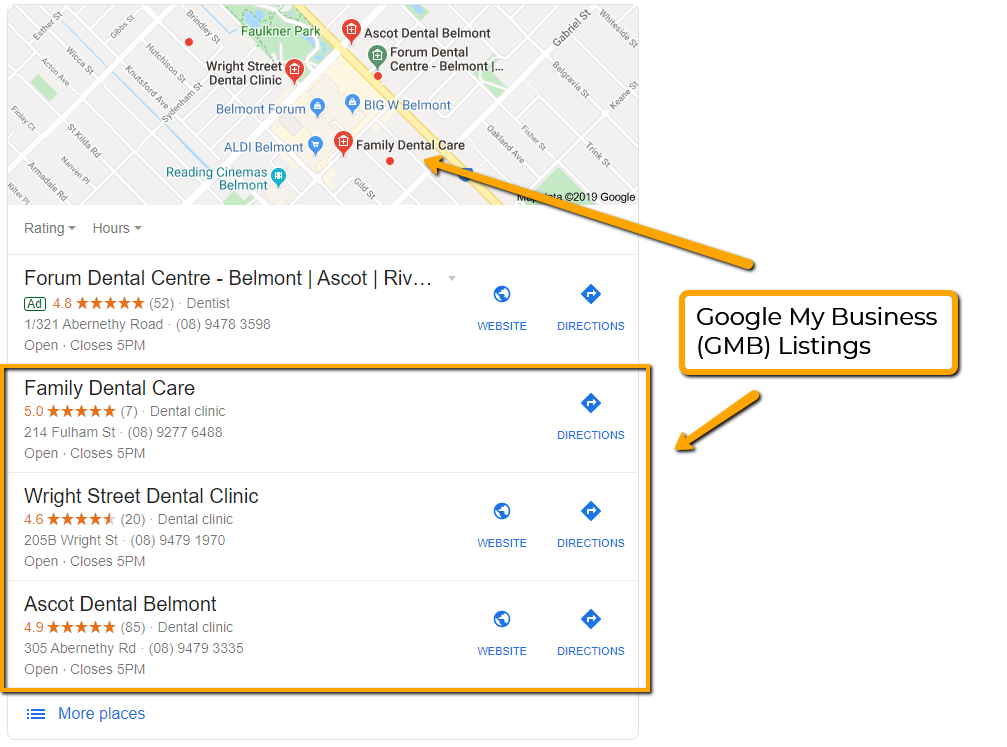
Make sure you set up and verify your business listing with Google.
(Google will send you a postcard in the mail with a verification code after setting up your GBP profile – your listing won’t be visible on the local search until you get this verified so do this as soon as possible).
Also, don’t forget to fill out your GBP with as much information about your business as possible.
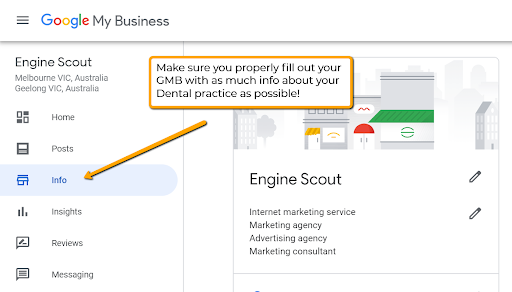
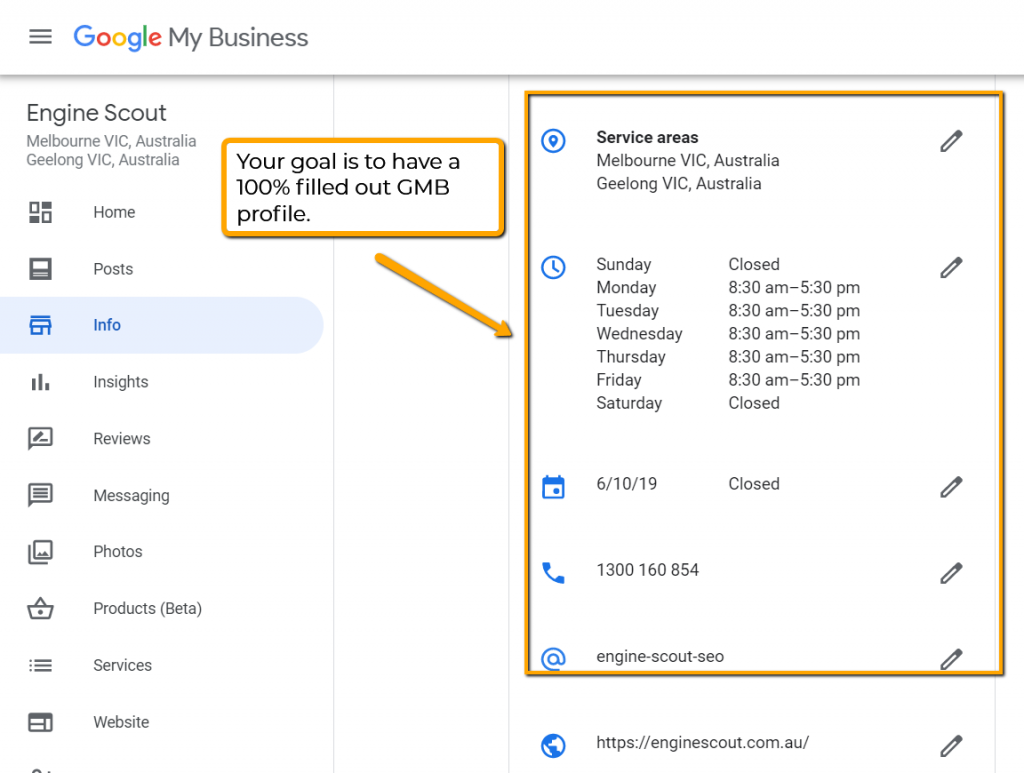
Here’s a checklist of everything you should fill out on your local GBP listing:
2. Automate Google Reviews
Reviews will increase the number of clicks on your local GBP listing, but more importantly, they send a strong trust signal to anyone considering booking an appointment with you.
Make sure you have an automated sequence for acquiring new reviews from patients.
An easy way to get Google reviews is to have an automated email sent to existing patients and ask them if they would mind leaving a review. Google makes this super easy by giving you a link straight to your review page that you can send to customers.

You Should See a Similar Link To This On Your GMB Account.
3. List Your Business on local directories
Local citations and directory links correlate directly with higher local rankings and online visibility of your Dental practice.
Citations and Directory links are local listing websites where you can register your business contact details. Some examples include the yellow pages, white pages, smile etc…
Important: Whenever you add your business details to a Directory, make sure your business name, address, phone and website details match with the details on your website. That way, Google can easily understand your business location and give you a nice boost to your local search results.
Pro-tip: Every time you create a new directory submission, record the login details so you can quickly edit your listing if things change, e.g. moving your Dental practice to a new location.
Creating content for your website is one of the most critical components of Dental SEO.
The problem is…
Most Dentists create content that has the opposite effect, driving customers away and hurting their Google rankings.
In the highly competitive space of dental SEO marketing, the ONE thing that will separate you from other practices is engaging and high-quality content that doesn’t put your audience to sleep when they read it.
Here’s a simple template for crafting high quality content:
Focus On ‘Buyer Intent’ Content
Your goal with Dental SEO is to get more appointment bookings and patients.
So it’s vital you prioritise your sites content to target people who are ‘ready to book’ an appointment.
Specifically, you want to make sure your home page and various service pages are optimised for ‘buyer intent’.
Why?
These are the pages on your website where patients will visit before deciding to contact you and book an appointment.
Remember: You should always be focusing on buyer intent as a priority because your goal with SEO is to get more appointments booked.
For example, let’s say you want your website to appear in Google whenever someone types in ‘Dentist Sydney’
Then you’d want the content on your web page to have this search term added to the following locations:
To make this easy, here’s an example you can follow:
Target Keyword: Sydney Dentist
Repeat this process on every sales/service page you want to generate more traffic for.
Crafting ‘Information Intent’ Content
I’m going to let you in on an ‘SEO insider secret’.
“Most SEO agencies avoid helping dentists with their blog to capture localised ‘Informational intent’ keywords.
And this is where it gets interesting…
The number 1 success factor for any SEO campaign is your sites ability to earn backlinks.
How can your website attract brand mentions, social media shares and backlinks if it doesn’t have any blog content?
Nobody is going to link to your homepage or service page and more importantly, Google knows this too.
A lot of agencies will simply buy links and point them directly to your service pages which looks unnatural and puts you at risk of a Google spam penalty.
Apart from a dental blog being a great asset to build links to, you can also use it to pick up additional organic search traffic from Google.
Your blog will be targeting informational type keywords where people are not ready to book an appointment right away but are considering making a booking.
For example: Keyword like “root canal cost”, “how long do crowns last” and “how do veneers work”
These are the keywords to build your dental blog content around.
“Most Dentists make the mistake of trying to get local journalists to write a newsworthy piece of content about their practice.”
And this is almost impossible to pull off.
Instead, you want to do something that makes journalists actually want to link to you.
For example, you could run a local smile make-over campaign or help the homeless with their dental needs and invite journalists to come to the event and they will love it because local journalists are actively looking for great stories to cover.
Expert tip: Your blog content must be engaging and interesting for your readers. Avoid writing posts boring posts like ‘10 Reasons Why You Should Book a Dental Appointment Every 6 months’.
Instead, use your expertise to give real value to potential patients!
Some Great Dental Content Ideas
Give away lots of great advice with your posts, show your patients why you’re worth booking an appointment with versus another Dentist.
Crafting great content will not only show people why they should book with you, but it will also serve as a vital cog in your link building efforts which is easily the most important aspect of Dental SEO.
How do you build links to a Dental website?
That’s what the next step is all about.
Link Building is one of the most essential parts of search engine optimisation.
Your dental website is no different. You will need to build backlinks in order to get great results from your SEO campaign.
The trick to building links is to focus on quality over quantity, it’s no longer a numbers game.
Dental SEO is one of the most competitive niches to rank, so building high-quality links is critical to your SEO success.
Citations
In order here are the best backlinks a Dentist could get to improve their rankings through SEO.
Getting links from health-related websites that publish articles about dental health. Links from local sites and local news outlets. Local dental associations and local business associations. Social Media and general directories are another great source.
Internal Link Structure
Creating internal links will help Google understand the most important pages on your website and those pages you want to rank. By adding internal links, you pass authority from one page to another and it can be highly effective when executed correctly.
Internal links will also distribute the link authority around your website and will help improve the rankings for all your pages.
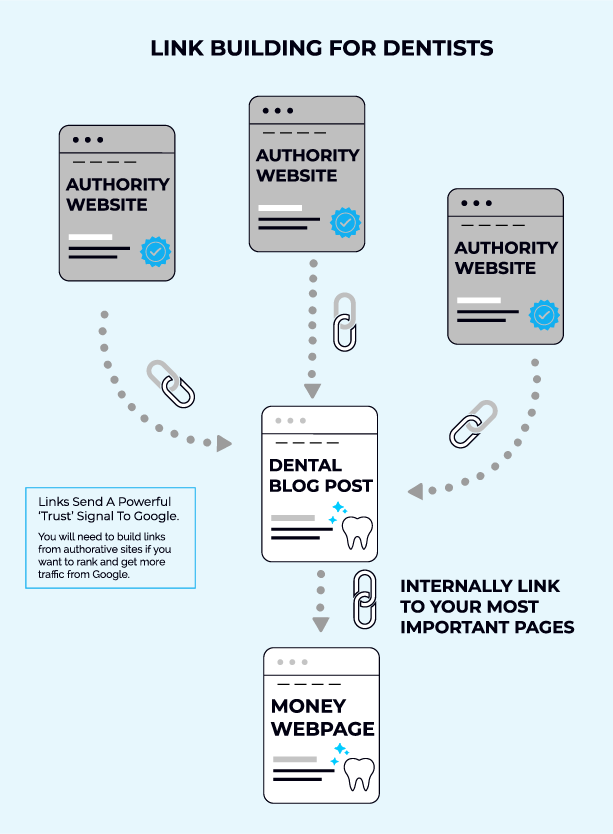
How to Build High-Quality Dental Backlinks
The best way to get links is to email people who have the power to link to you.
But before you do, you need to give these people a valid reason to link and that’s why it’s so important to have a content marketing plan and strategy already in place.
Once you have at least one blog post, you can start outreaching to other websites asking for them to link back to your dental website.
Resource Pages
A resource page is a page on another website that links out to great resources on other websites. These resource pages are gold mines for earning some great backlinks and there are plenty of these types of pages on the internet for Dentists to target.
Here’s a list of Google search operators you can use to find Dental resource pages.
These search operators will help you find some great resource pages. All you have to do now is email the site owner and ask them to include your amazing blog content.
Guest Posting
Guest posting is a fantastic way to build some powerful backlinks quickly.
Guest posts are simply writing an article on another website. You want to make sure that when you do this, you also link back to your site.
Here’s an example of a Guest post I wrote linking back to my own website:
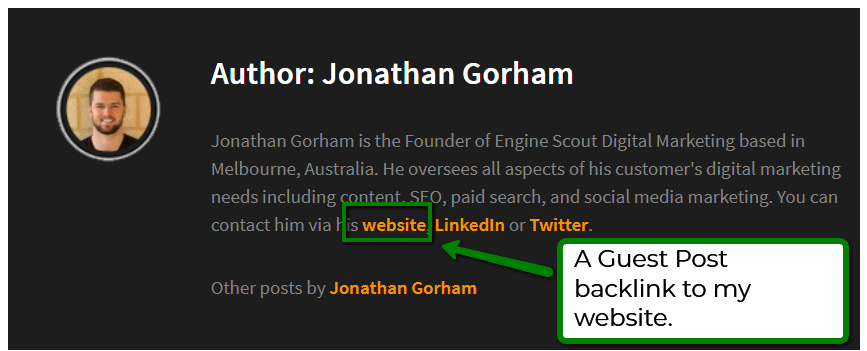
What’s great about this method is you don’t even need to have a blog to do it.
Here are some search operators you can use to find great Dental related guest posting opportunities:
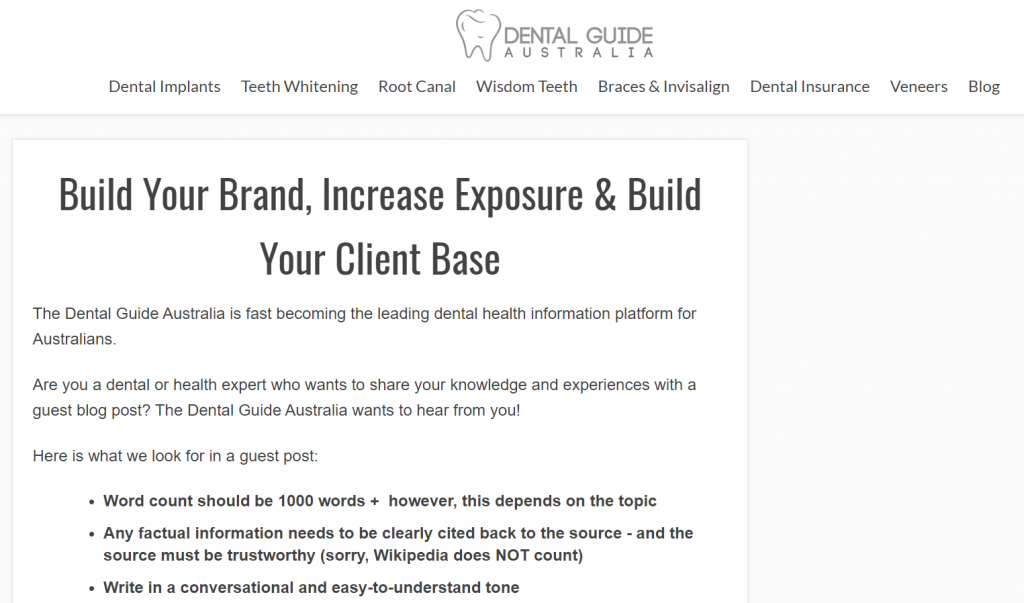
Expert tip: You should write guest posts yourself, don’t outsource this to another writer because you’re the expert and will have more knowledge than generic writers when it comes to Dental related topics.
After you build a couple of quality backlinks, you will see an increase in organic traffic as long as you’ve applied all the correct technical and on page SEO corrections.
Putting all this effort into getting more traffic from Google, you want to ensure your Dental SEO efforts are paying off.
To do that, we’re going to use two free tools provided by Google called Google Analytics and Google Search Console.
You can quickly track organic traffic improvements using the following methods.
Tracking Keyword Rankings
Knowing what keywords your site is ranking for gives you an understanding of your websites online visibility. It also allows you to quickly check that your website is appearing for your most important keywords.
We’re going to use Google search console (GSC) to see what search terms people use to find your website.
GSC shows you what keywords your website is ranking for.
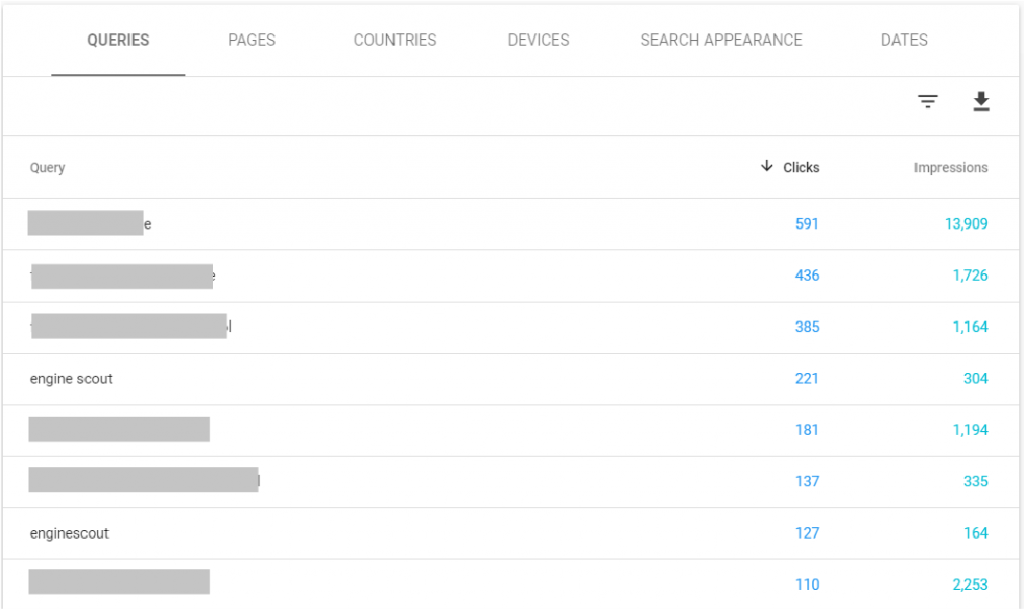
GSC also shows you which pages bring the most organic traffic from Google.
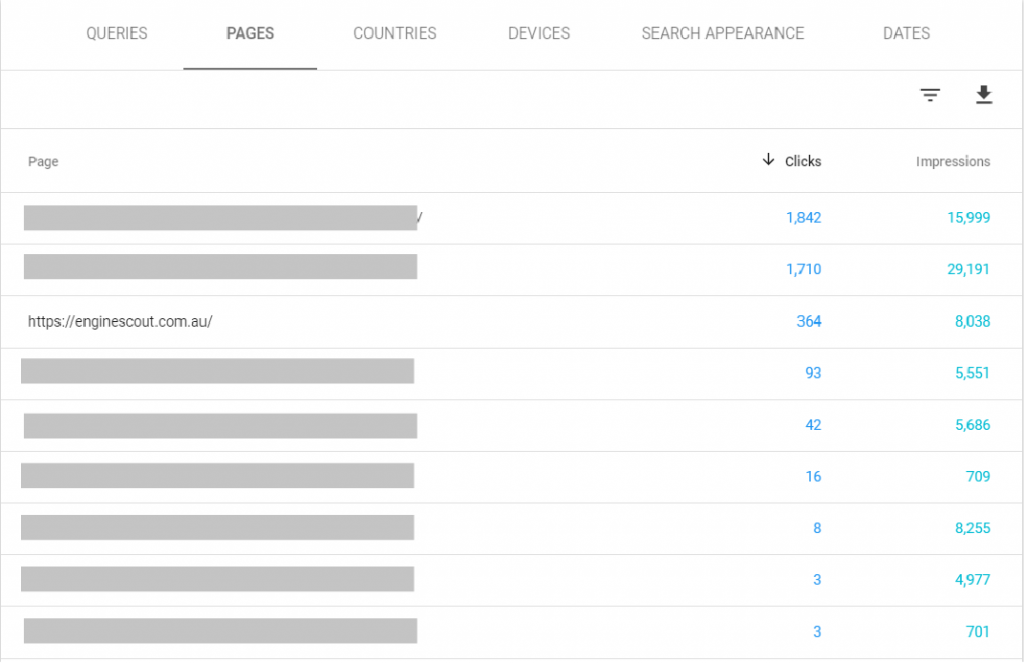
Measure Organic SEO Traffic With Google Analytics
You want to check your actually getting more traffic from Google, right?
You can easily check your organic traffic using Google analytics.
If your SEO is working, then you’ll see an upward trend in the number of users visiting your website.
Please note: Don’t be concerned if you notice traffic has dipped for some time, up and down fluctuations in traffic are completely normal, what’s important is that the long term trend is going up.
Record Phone Calls and Appointment Bookings
Hands down the most crucial measure of success for your Dental SEO efforts will be seeing that it’s resulting in more patient bookings.
There are two leading success indicators you’ll want to track and those are:
Setting up proper tracking for these can be a little bit complicated because you’ll need to use both Google Tag Manager and Google Analytics to set these up.
You’ll need to go ahead and set up both tags and triggers in Google Tag Manager.
At the end of the day, SEO for your dental practice is all about increasing your revenue.
To track using Google Analytics, you can set up several goals you’d like your website to achieve.
Now that you have all the steps needed to be successful with dental SEO, it’s time to put them into practice.
Want better results from your dental SEO campaign?
Download Now.
4 Responses
I needed to be successful with dental SEO. Its really excellent article in your blog. Thanks for sharing this blog.
Nice article, Clearly explained for dental SEO & Technical ideas sharing in your article. Thanks for sharing your blog.
Just signed up a new client that asked my for some guidance on their SEO. Stumbled on your article and will share this with them.
Thank you for this guide on Dental SEO! The tips are practical and very applicable. It’s great to see quality content that helps dental practices shine online. Keep up the excellent work!